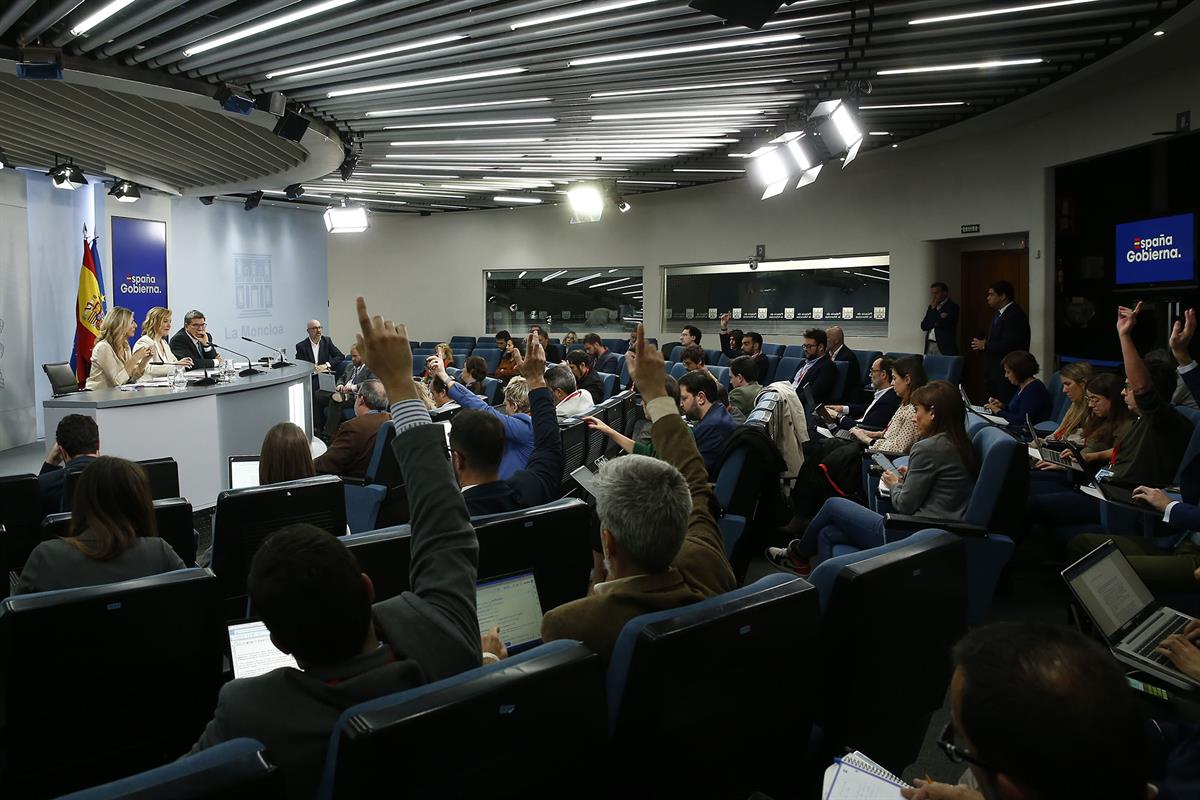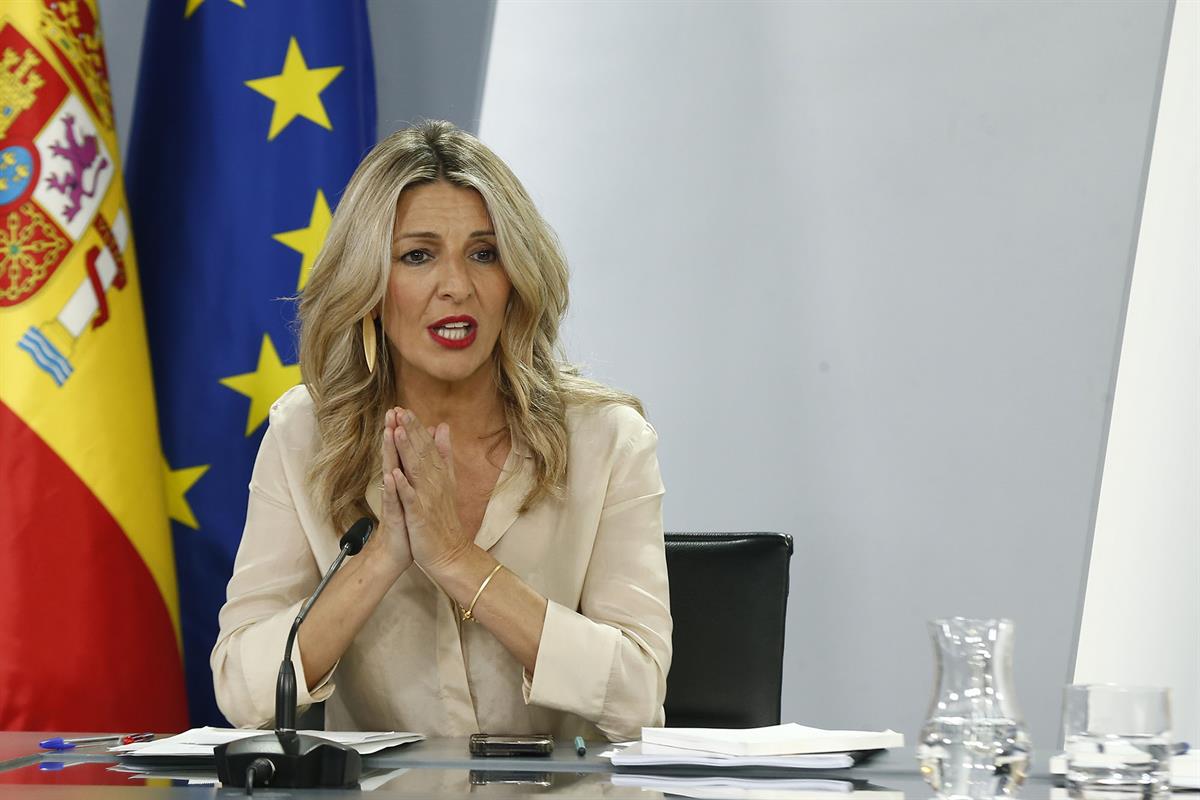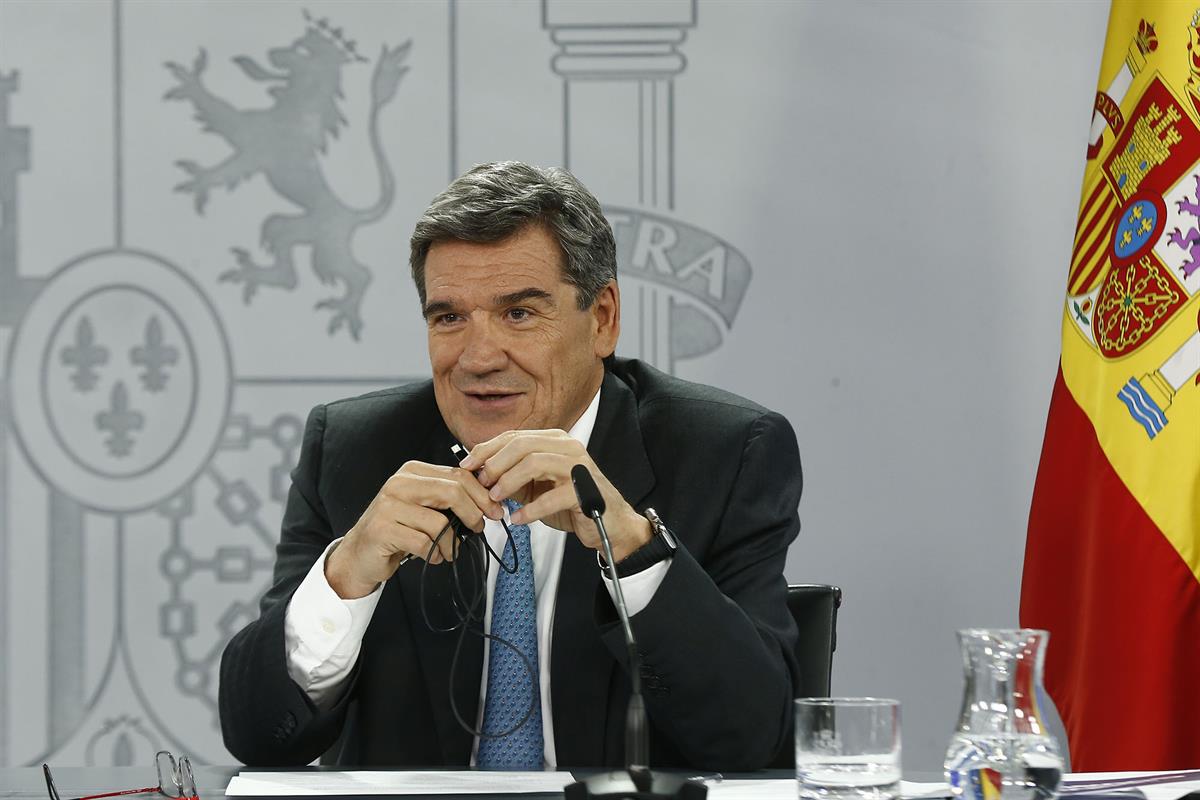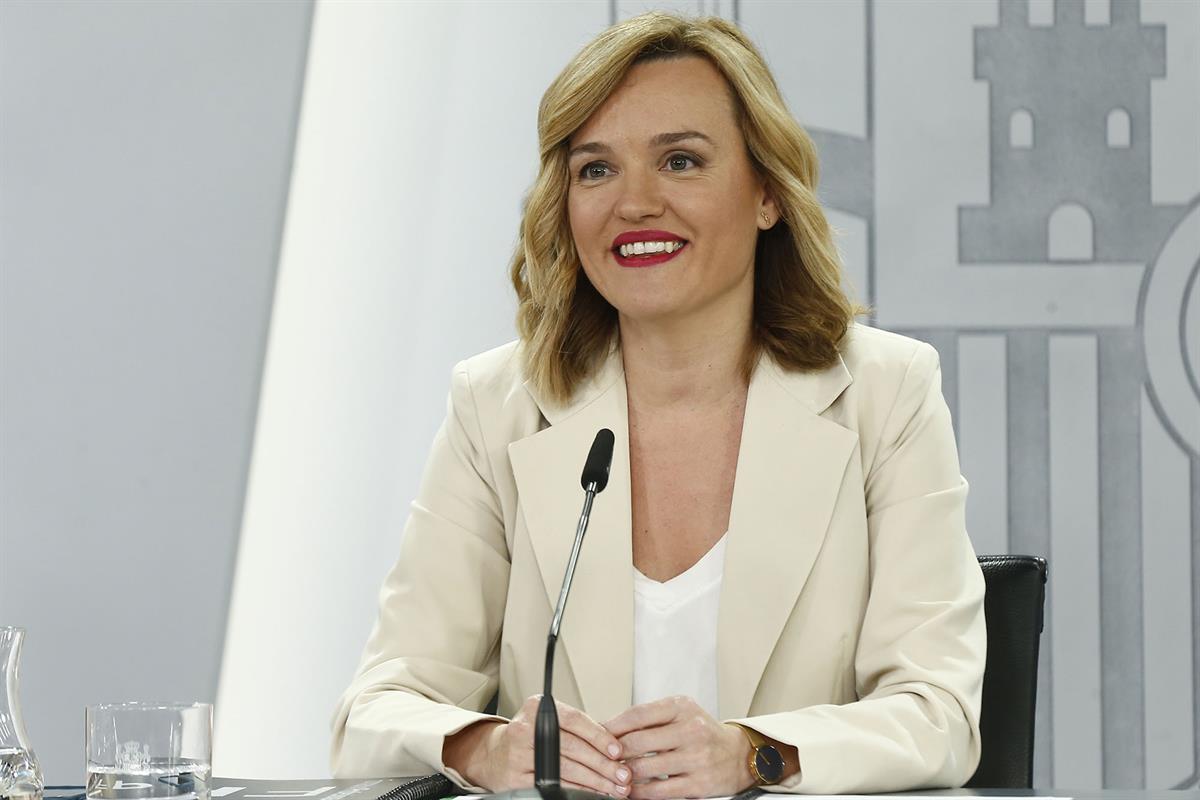Council of Ministers
The Government of Spain establishes a comprehensive and common portfolio of services for the unemployed throughout the territory
Council of Ministers - 2024.4.30
Moncloa Palace, Madrid
 The ministers for Work and Social Economy, Yolanda Díaz, for Education, Vocational Training and Sports, Pilar Alegría, and for Digital Transformation and Public Function, José Luis Escrivá, during the press conference after the Council of Ministers (Pool Moncloa/José Manuel Álvarez)
The ministers for Work and Social Economy, Yolanda Díaz, for Education, Vocational Training and Sports, Pilar Alegría, and for Digital Transformation and Public Function, José Luis Escrivá, during the press conference after the Council of Ministers (Pool Moncloa/José Manuel Álvarez)
By means of a Royal Decree, the Council of Ministers has developed the common portfolio of services of the National Employment System and the services guaranteed in the Employment Act.
The Second Vice-President of the Government and Minister for Work and Social Economy, Yolanda Díaz, highlighted the relevance of the regulation for people who are unemployed, as well as its approval in the very week that International Workers' Day is celebrated. Díaz encouraged citizens to take part in the demonstrations on 1 May, recalling that in the first demonstration, held in 1890, workers were calling for an 8-hour day, while nowadays the unions are calling for "gaining time for living and a continued rise in wages".
Along these lines, the second vice-president said that this term of office will be marked by reduced working hours, just as the last term will be remembered for the "paradigm shift" it brought about in the labour market in terms of temporary and precarious employment. Yolanda Díaz recalled that the labour reform, the Minimum Interprofessional Wage increase and other Executive policies managed to not only reduce temporary employment from 26% to 12.2%, but they also increased the active population by one million people.
Equal access to public employment services
The regulation approved today changes "the culture of employability" in Spain, according to the head of the Ministry of Work and Social Economy, as the unemployed become "holders of rights they will be able to claim, with a minimum of commonality, before any of the administrations of our country". Negotiations with the autonomous communities have enabled a common portfolio of services for unemployed people to be established, without infringing on each community's capacity to deploy a complementary portfolio, "but always guaranteeing identical rights".
 The Second Vice-President of the Government and Minister for Work and Social Economy, Yolanda Díaz, during her speech at the press conference after the Council of Ministers | Pool Moncloa/José Manuel Álvarez
The Second Vice-President of the Government and Minister for Work and Social Economy, Yolanda Díaz, during her speech at the press conference after the Council of Ministers | Pool Moncloa/José Manuel Álvarez
Within a period of three months, the employment services must compile a profile of each unemployed person, including the resources they have and those they need, and within a second period of one month, a personalised itinerary based on this diagnosis. The vice-president assured that the unemployed person will at all times have a professional to guide them to improve their training and employability. Jobseekers will also be able to opt for personal or digital attention and will have a single labour card, similar to the health card, which will allow them to access their digitalised information and training from any public employment service in Spain.
The regulation also sets out the services to be offered to the self-employed who, in addition to improving their skills, will be able to receive advice on the viability of their business projects.
Key target, the unemployed over 52 years of age
The second vice-president highlighted the weight of people over 52 years of age in the total number of unemployed, representing around 40%. This represents 1,097,000 people "who have been unemployed for too long or who are stuck in a situation of unemployment". In this regard, the Sectoral Conference on Employment on 4 April last year agreed to focus active employment policies on this group.
Yolanda Díaz explained that the evaluation of all these policies is being carried out both before and after they are implemented, in accordance with the recommendations of the European Commission and the Independent Authority for Fiscal Responsibility (AIReF).
Regulation of influencers
The Executive has approved a Royal Decree that establishes the requirements for regulating 'influencers', in compliance with the General Law on Audiovisual Communication approved in 2022. The regulation gives greater protection to consumers and more legal certainty to these particularly important users.
The Minister for Digital Transformation and Public Function, José Luis Escrivá, pointed out that audiovisual content creators are becoming increasingly important on social networks, which is why they must be brought into line in some aspects with other actors in the audiovisual field.
The standard defines what is meant by 'influencer' in terms of three criteria: revenue, audience and activity. The economic criterion requires that these actors have an annual income of more than €300,000 derived from their audiovisual activity. The audience criterion is more than one million followers on a single video platform or two million followers across all of their applications. In terms of activity, they must have posted or shared at least 24 videos per year.
Creators who meet these requirements have a period of two months to register in the State Register of Audiovisual Providers as users of special relevance.
 The Minister for Digital Transformation and Public Function, José Luis Escrivá, during the press conference after the Council of Ministers | Pool Moncloa/José Manuel Álvarez
The Minister for Digital Transformation and Public Function, José Luis Escrivá, during the press conference after the Council of Ministers | Pool Moncloa/José Manuel Álvarez
José Luis Escrivá explained that influencers will have to comply with regulations on the protection of minors and advertising in the audiovisual field. To this effect, they will have to label the content they post on the networks according to the age of the users being addressed, and digital age identification tools will be implemented to prevent minors from accessing inappropriate content. They will also have to identify and label advertising content and may not advertise tobacco, alcohol or medicines, or launch advertisements that may cause physical or mental harm.
The minister stressed that the measure approved today establishes "a level playing field" with other already regulated sectors in the field of audiovisual content, and controls surreptitious or potentially surreptitious advertising broadcast by video applications. He also highlighted the collaboration of content creators in the development of the standard.
Mandatory single charger this year
The Government has approved a regulatory amendment requiring that all new chargers for electronic devices be USB type C, transposing the European directive on this matter.
Chargers for mobile phones, tablets, cameras, headsets, mice, keyboards, headsets with microphones, portable game consoles, ebook readers, GPS systems, in-ear headphones and portable speakers must be Type C from 28 December 2024, and for laptops from April 2026.
In the opinion of José Luis Escrivá, this regulation will be extremely useful because it will allow the interoperability of chargers, reduce electronic waste, improve the information the purchaser receives about these devices - which will have a single plug, but different power ratings - and offers the possibility of purchasing equipment without a charger.
5G cybersecurity scheme
The Council of Ministers has approved the Royal Decree regulating the National Security Scheme for 5G Networks. This standard describes the procedures, certifications and security schemes that operators must perform to manage and mitigate 5G cybersecurity risks associated with networks.
The minister pointed out that one of the new features of the regulation is the creation of a 5G Operations Centre, a pioneer in Europe, which is being built with funds from the Recovery, Transformation and Resilience Plan, in collaboration with the National Cryptologic Centre belonging to the Ministry of Defence.
The minister stressed the importance of cybersecurity in the transmission of information and data over networks, especially in facilities that are particularly critical from a national security perspective, such as nuclear power plants. He also argued that the digital transition would be limited without the security that goes with it.
Integral Plan for Smoking Prevention and Control
The Executive has approved the Integral Plan for the Prevention and Control of Smoking 2024-2027, which aims to reduce consumption of tobacco and related products (electronic cigarettes, with and without nicotine, herbal smoking products, nicotine sachets or any other product containing nicotine, whether natural or synthetic, or which does not contain nicotine but mimics the act of smoking) and environmental exposure to its emissions.
The plan has been drawn up by the Ministry of Health, in collaboration with the autonomous communities and local bodies, scientific societies and related entities. A large part of the measures will be implemented through the modification of the current basic regulations on smoking (Law 28/2005 and Royal Decree 579/2017) that the Government has committed to carry out during this legislature.
During her speech at the press conference following the Council of Ministers, the second vice-president of the Government and minister for work and social economy pointed out that "it is a fundamental measure for public health" that recognises the right of citizens to have smoke-free and tobacco-free spaces in their lives. She also highlighted the work of the Minister for Health, Mónica García, in drawing up the regulation.
Assessment of GDP growth
At the beginning of her speech, the Minister for Education, Vocational Training and Sports and Government Spokesperson, Pilar Alegría, assessed the advance of the data from the Quarterly National Accounts published today by the National Statistics Institute (INE), which confirm 0.7% growth in GDP during the first quarter of the year.
 The Minister for Education, Vocational Training and Sports and Government Spokesperson, Pilar Alegría, during the press conference after the Council of Ministers | Pool Moncloa/José Manuel Álvarez
The Minister for Education, Vocational Training and Sports and Government Spokesperson, Pilar Alegría, during the press conference after the Council of Ministers | Pool Moncloa/José Manuel Álvarez
Alegría, who described this figure as "extraordinary", said that the figures "once again show the solidity of the Spanish economy", recalling that Spain is one of the fastest-growing large EU countries, doubling the average of the rest of the EU economies. "We create four out of every ten jobs generated in the EU", said the minister, who also described the tourism-related forecasts for next summer as "magnificent".
Vicente del Bosque, President of the RFEF Supervisory Committee
The Minister for Education, Vocational Training and Sports has announced that Vicente del Bosque will be the president of the Supervisory Commission of the Royal Spanish Football Federation (RFEF), a body that was set up last week with the objectives of representing Spanish football, ensuring the transparency of the electoral process planned for the RFEF after the Olympic Games and dealing with the forthcoming sporting events in Spanish football: "Vicente del Bosque is going to be the face of Spanish football. We are going to see him in the next Champions League final in Bilbao, and we are also going to see him during the European Championship and, of course, in the Summer Olympics.
Alegría, who referred to the former Spanish national coach as "a person of great human quality and the essence of honour", thanked Vicente del Bosque for his commitment to Spanish sport by accepting to represent him in the upcoming challenges.
Non official translation




